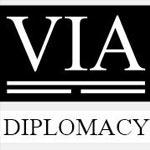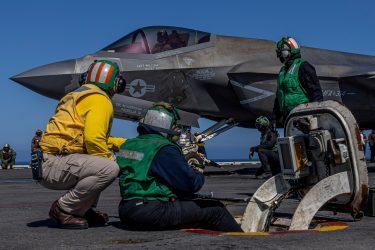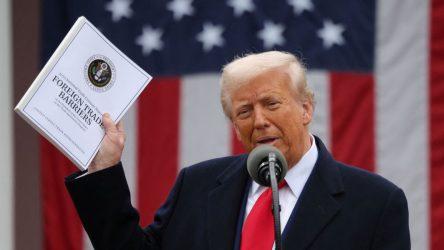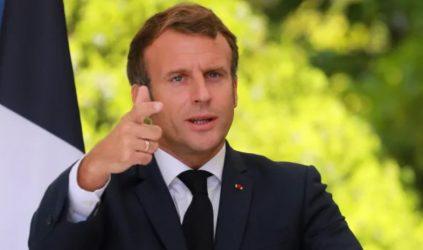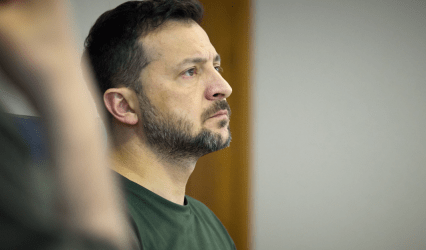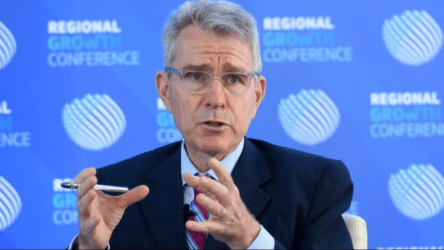Delphi Economic Forum – Ambassador Geoffrey R. Pyatt’s Conversation with Tom Ellis
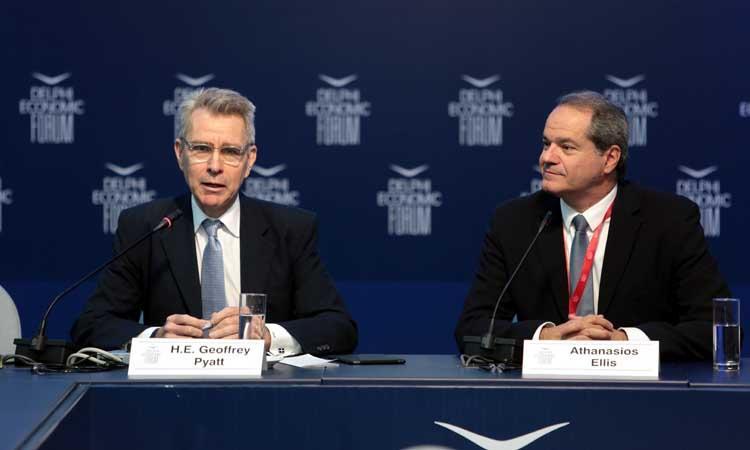
Ambassador Pyatt: First of all, thank you Tom for doing this. We have a little bit of a road show now. I feel like we’re one of those Las Vegas acts. But it really is an enormous pleasure for me to be back here at Delphi. I want to start with huge congratulations to Symeon and to the organizers for what I think has become a very important institution on the Greek political calendar.
As I was getting ready for today – and this is my third one of these – and overthree Delphi Forums there have been millions of words and thousands of Tweets and many, many cups of coffee, but I was trying to reflect how this feels different compared to 2017 or 2018.
I just wanted to set the table with a couple of reflections on that. And as I tried to crystallize my thoughts, I think the most important point is that Greece is back. Greece is back as a foreign policy actor in the region. The most visible manifestation of that, of course, is the Prespes Agreement and the opportunities that that has opened up for further progress in setting all of the countries of the Western Balkans on their path towards the Euro-Atlantic community, but also in terms of unlocking the untapped economic potential, especially of connectivity between Thessaloniki and the larger Balkan neighborhood, to restore Thessaloniki’s historic role as this cosmopolitan crossroads, the gateway for commerce, for energy, for connectivity and technology between the Balkans and the rest of the world — extremely important.
But that’s far from the only manifestation of this. Greece is back in terms of the East Med. You see that in the thriving Greece-Israel relationship, the very successful Greece-Israel-Cyprus Trilateral, and I’ll have a little bit more to say about that later.
You see it in terms of Greece’s role as an energy hub — probably one of the issues that has seen the most dramatic evolution during my three years here with thecompletion of the TAP Pipeline, thecommencement of work on the IGB Pipeline, the completion of the expansion of Revithoussa’s terminal and the ability that that has created to take deliveries of American and other LNG.
Most importantly, all of these projects will also help not only to deepen energy security in Greece, but also to unlock the Balkan energy island for all of the countries to the north of Greece that are 100 percent dependent today on Gazprom and Russia’s use of energy as a political weapon. Greece is the key to unlocking that situation.
And then Greece’s increasingly important role in regional security. Our counterterrorism cooperation is as close as it’s ever been. Greece cooperates closely with the United States in terms of our NATO platforms, the work we do together at Souda Bay, the way in which Greece and America work together on maritime domain awareness and security in the Eastern Med and the Aegean — at a moment when great power competition has returned to the Eastern Med in a way that we have not seen for more than two decades.
So all of this plays into the vision that I talked about here at Delphi I think the first time that I was doing one of these conversations, and that’s the role of Greece as a pillar of regional stability. But I think that vision today is more valid than ever before. We have work to do on the economic side, and Tom and I will talk about that.
The flip side of Greece being back is that America is back. You saw that at the Thessaloniki international Fair which I think will be remembered as a real watershed moment in the U.S.-Greece relationship, and especially our relationship with Northern Greece.
You saw that in the launch of the Strategic Dialogue by Secretary of State Pompeo and Foreign Minister Katrougalos in December and the active efforts that both governments are making to sustain that momentum, continue working in those lanes.
And then you see it in the promulgation of a new American policy for the Eastern Mediterranean which is one of the projects that Wess Mitchell, our former Assistant Secretary of State, really prioritized, and — among other things — has set the stage for American participation in the 3+1 as we call it: the trilateral Greece, Israel, Cyprus, now with an American chair.
Then finally you see it in the very robust American presence at the Delphi Forum this year, and I’m extremely proud that we have so many colleagues from Washington. I’m not sure there’s anybody left on Dupont Circle today. It’s fantastic to have such a strong presence of the American policy community and the transatlantic policy community here at Delphi.
So Tom, that’s the big think, and now you can go to the small one.
Tom Ellis: Usually we hear of these big ideas and presentations with [inaudible]. Let’s get down to the real things. You talk about investment, the need for investment, U.S. investment. American companies are companies that cannot follow the government’s rulings, unlike the encouragement of, or the decision actually as of the Chinese government, the Russian government, other governments, they will make their own decisions. But can you point or explain or show us some specific cases of American firms that are interested, are involved, are invested, will invest? In real tangible terms what U.S. interests involving as far as the economy of Greece is concerned.
Ambassador Pyatt: Let me answer that two ways. First of all concretely, we can point to a number of specific successes, but what I would emphasize is how much the atmospherics have changed. When I was getting ready for this job three years ago, and as Ambassadors Designate do, I asked the U.S. Chamber of Commerce to arrange a roundtable for me with American companies interested in Greece. Nobody came. Zero companies. Nobody wanted to look at Greece because they were worried about Grexit. They were worried about the risk that the banking system was going to implode. They were worried about uncertainty as to whether or not the SYRIZA government would comply with its conditionality obligations.
Today —- we had, at the Thessaloniki Fair, thanks in large part to our partners at the American Chamber of Commerce, and I’m glad Simos is here, more than 50 top American companies, all of whom spent a considerable sum of money to be present in Greece because they saw the opportunities here, they saw the opportunities that TIF represented to talk to not just a market of 10 million in Greece, but a larger market of 30 million. I think that’s a theme that we will continue to emphasize.
We have specific successes we can point to like the ONEX investment in the Syros shipyard; like Hyatt and Marriott expanding their presence here; Avis, Lime Scooters in a small way.
The other point I will make, especially since we’re in Central Greece, I should add this. I had the opportunity last week — exactly a week ago I was in Lamia and Karpenisi along with Governor Bakoyannis. I was incredibly inspired, encouraged by the team effort that Governor Bakoyannis put together, and it really crossed political lines. There were PASOKindividuals, there were people from New Democracy, but it was a team of 30- and 40-somethings who were focused on how to get things done. Governor Bakoyannis also took me, while we were in Lamia, to see a couple of companies that were successful, both in the agro-food sector.
One of these companies was actually founded just a few years ago. It was founded at the peak of the crisis, but it’s now growing and investing and expanding. Actually it’s a natural partner for the work that the embassy has been doing to encourage Greek entrepreneurship, to support the startup sector. I always say the biggest secret story of the Greek economic crisis is how underneath that crisis the Greek startup sector has surged forward. I know Bloomberg and others have now reported on the thousands of companies, Greek startups, that have registered. That reflects both the enormous potential, the human capital that this country possesses, but also the fact that in the aftermath of the crisis the old business structures are being replaced and they’re being replaced from the grassroots including in a lot of cases not in Athens but from Thessaloniki or Lamia or in other cities, in Patra where you’ve got a thriving startup community.
These are stories that I think we all need to do a better job of getting out because that’s what will attract American investment interests.
Tom Ellis: One big issue that you’ve dealt with is energy. You talked about Greece becoming a hub, although sometimes we think we are the center of the world and we are “the” hub. But anyway. We do have LNGfrom the U.S. Can you be a little more detailed in your analysis as far as IGB, TAP and also given the latest with ExxonMobil in the Cyprus EEZ and the possibility of LNG again, or building the East Med Pipeline. What’s the prospect there? And how does the U.S. view that? We have an idea from the European Union, but how does the U.S. view it.
Ambassador Pyatt: A couple of things. First of all, I should emphasize the longstanding American support for strengthening diversity of sources and routes for energy in Europe. If you look at the European energy market today, maybe aside from Poland, Greece is probably the most dynamic national marketplace where you are seeing real progress in terms of achieving energy independence. We have Ambassador Morningstar here this weekend. Dick Morningstar has been working on the Southern Gas Corridor for more than 20 years.
This year the TAP Pipeline, the last leg of the Southern Corridor, will be completed. It’s completed because of work which began under the New Democracy government and was sustained under a SYRIZA government. In fact the SYRIZA government, which today has been playing an active role in convincing the Italian government, also on the left, to do their part of the work to make sure that TAP is finished on time. So TAP is extremely important.
I would also note the upstream possibilities in Greece. The fact that you have ExxonMobil not only conducting exploration off of Cyprus, but ExxonMobil has a partnership with Total and Hellpe for exploration south of Crete. We’re very hopeful that Minister Stathakis will complete the last bit of paperwork associated with that, and I would encourage everybody to ask him that question when he’s here later this weekend. But that is moving ahead as well.
On East Med I’ll say three things. First of all, at a strategic level it’s an extremely important project that the United States strongly supports. It complements everything that we’ve been doing with the 3+1, our support for the flourishing Greece-Israel relationship.
The market is going to decide whether the pipeline is constructed. Obviously the discoveries that ExxonMobil announced yesterday will have a positive impact on those market calculations, but certainly at the political level, as Ambassador Friedman, my counterpart in Jerusalem made clear when he participated in the last Greece-Israel-Cyprus Trilateral, the United States is all in.
Tom Ellis: Because until recently, remember a few years back the U.S. was in an, I’ll say off the record, sometimes on, supporting more the possibility that the pipeline would go from Turkey.
Ambassador Pyatt: Our support —
Tom Ellis: — companies do their decision, but still you could feel from the State Department and elsewhere that that’s the shortest, cheapest, you know what I’m saying. But it’s not the case anymore maybe because developments in Turkey itself have changed the equation.
Ambassador Pyatt: And the 3+1. The deepening of the Greece-Israel relationship is a very important factor here. The fact that you had a member of the Israeli Cabinet speaking to us last night at Delphi is an important signifier.
I would also — the other project which we haven’t talked about, and I should, is the FSRU in Alexandroupolis. Again, particularly important to unlocking that Balkan energy island and expanding opportunities for exports into Greece of LNG. We’re very hopeful that the FSRU also will move ahead. Gastrade, the consortium lead, had a successful market test a few weeks ago, and we will continue to work hard to support that as well — which is interesting because it fits, it nests within several other projects in Alexandroupolis. The port privatization in which we have American company interest, the privatization of the Egnatia where we don’t have American interest, but others are. And perhaps most importantly, the strategic importance of Eastern Macedonia and Thrace in the context of the larger U.S. strategy for the Balkans and the larger Black Sea region.
Tom Ellis: You mentioned the 3+1, Greece, Cyprus, Israel, and the U.S. seems to be getting more involved. There is some preparation for another summit. We, as Greeks, are used to these summits. The Prime Ministers of three countries. The next one will be in Crete. March, April. Is there a possibility that Secretary Pompeo might participate? Are we at a point where there was some thought about that? I’m not sure if —
Ambassador Pyatt: This was a part of the conversation between Secretary Pompeo and Minister Katrougalos in December, and my boss, the Secretary of State, made clear that he intends to participate in the 3+1. It’s a logistics question now in terms of figuring out where and when we make it happen. But I’m very confident — the policy is clear, and it’s just a matter of working the mechanics.
Tom Ellis: Okay, that’s kind of newsy. It’s nice to know that [inaudible] through the discussions we did something newsy.
You always talk about the strategic relationship, alliance partnership. Can we be a little bit more specific? To be honest, I hear a lot of friends, not politicians, you know ordinary people who like on a certain level the fact that Greece has a good relationship with the U.S. It’s a little bit surprising in a positive way, but as such [imaudible] with the [inaudible] government. But I think that’s a part of maturization or maturity [inaudible] in Greece.
But can we view it in more specifics. What are the benefits for Greece, according to you of course, through that or from that strategic alliance on defense and other areas? I mean it’s one thing to say, I remember in 2005 Condi Rice first mentioned strategic relationship with Petros Molyviatis, then Foreign Minister. And we were all happy in a way, but then tried to analyze it and we didn’t know in specific, tangible terms what it means. What does it mean, strategic initiative?
Ambassador Pyatt: Tom, I think first and foremost that’s a question you have to put to the Greek government. What I will say is the following. First of all, every American who comes to Greece appreciates the complicated strategic geography of itsneighborhood, and if there’s one thing that I’ve learned through 30 years as an American diplomat, it’s that geography trumps philosophy. Geography matters.
Greece lives in a complicated neighborhood vis-à-vis your large neighbor to the east; but also a complicated neighborhood vis-à-vis North Africa and the Magreb, the refugee problem; vis-à-vis the Eastern Med, which as I said— I’m always struck when Admiral Foggo talks about this, about how when he was a young naval officer cruising around the Mediterranean, it was basically a lake cruise for the U.S. Navy. Now you have an aggressive Russian naval presence in the Eastern Mediterranean, a Russian base at Tartous, the expansion of the Russian footprint in Crimea, in occupied Crimea, and leveraging that to project power and influence into the wider neighborhood. But Russia is not the only part of the story.
So in this complicated region we, the United States, view Greece as a pillar of stability. That was the phrase that Secretary Pompeo used when he was with Minister Katrougalos. I think, and here again I don’t want to speak for the Greek government, but I think Greek people that I engage with see the United States presence as reassuring. That’s why when I was in Alexandroupolis a few months ago talking to the Mayor, he was extremely enthusiastic about the fact that we were rotating American helicopter forces through Alexandroupolis. Not because he was a big fan of NATO but because he saw the American presence as reassuring. Sending a confidence-building message to investors, to the international community, at a moment in time when there are other reasons which encourage anxiety.
Tom Ellis: Speaking of anxiety in other regions, how do you assess Turkish policy these days towards Greece? And also the development we have here in our domestic politics with the new Defense Minister. A lot of key people think that Mr. Apostolakis is somebody who can work better with the Turks, but I’m just wondering what your assessment is and for the CBMs that they seem to be working on. You mentioned your previous presence here. Three years, was it, or two years? You mentioned your anxiety about hostility of how should I call it, hot incident in the Aegean or an accident? Are we in a better place in this?
Ambassador Pyatt: I think we are. Let me start with Minister Apostolakis, who I would emphasize has the highest respect from his counterparts in the Pentagon. There was a very good letter that was just sent from Acting Secretary of Defense Shanahan just the other day following up their conversations at the last NATO Defense Ministerial. He’s also highly regarded as a soldier by his counterparts, General Scaparotti, General Dunford, Admiral Foggo. That counts for a lot. But there’s also tremendous appreciation in Washington for the efforts that Minister Apostolakis has made to open a clear channel of communications with Minister Akar. And at the end of the day, these are two NATO allies and for the United States, a paramount objective is to ensure that Greece and Turkey are NATO allies in fact and are able to behave as such.
You talked about two years ago. What I remember was one year ago, and this morning, this very morning [a year ago]about 2:00 o’clock on the Friday morning of the Delphi Forum, I got a knock on my door and it was my guys informing me that two Greek soldiers had been taken on the Turkish border — so a reminder that it wasn’t that long ago when there were a lot of points of irritation. You have the collisions of vessels, the activities of the Turkish Coast Guard vessel. It’s a very positive development that Minister Apostolakis is so strongly focused on this. I also appreciate the fact that the Foreign Ministers and Secretary General Paraskevopoulos are working on the CBMsagenda, again.
I remember when I was getting ready for this job I had lunch with Ambassador Ries, and Charlie gave me a RAND paper on Aegean CBMs and said why don’t you take this and keep it on your shelf. There may be an opportunity to work on it at some point. I’ve still got it on the shelf, Charlie. But we are hopeful that the process that the Prime Minister and President Erdogan agreed to last month in Ankara will make it possible to revive some of those conversations as well.
Then I think also extremely, extremely important, both the imagery but also the practical impact of the Prime Minister’s trip to Istanbul, his visit to the Halki Seminary. The United States, American policy has been very clear on our support for the Ecumenical Patriarch, the important role that the church plays and that the Patriarch plays as part of the West. Reopening Halki is part of strengthening the Ecumenical Patriarch’s hand in the existential battle that is now underway between the Church of Constantinople and the Moscow church, and Patriarch Kirill. So very, very important as well.
Tom Ellis: This is about Greece and U.S., but just the Greek analysis of your assessment on the President of Turkey. It’s a big issue for the world, not only Greece. The European Union, the U.S., should we trust Mr. Erdogan in that [inaudible] all the other things you mentioned, from Cyprus to the Balkans to he seems to be building a lot of mosques in the area we’re told to respect Islam. He is doing it. So there might be some other ideology behind it. So how are you assessing —
Ambassador Pyatt: Let me just say two things. In the context of American strategy in Southeastern Europe, Greece and the United States see eye to eye. In fact we probably see closer eye to eye than we, the United States, do with almost any other NATO partner in terms of our shared interest in seeing that Turkey remains anchored in the West, in working through the difficult issues that both of our governments have. We are in a difficult moment still in the U.S.-Turkish relationship.
I would also note that I am very pleased that David Satterfield, one of our most senior and most respected ambassadors, has been nominated to serve in Ankara. He has a more difficult job than I do, just like John Bass had a more difficult job than I did, and it’s been a long time without an American Ambassador there.
Tom Ellis: And a last point on Turkey, [inaudible]. Are you worried about things developing to the [inaudible]. Because last time you talked about the Aegean, about the islands, [inaudible], which is real, but it’s also theoretical. In the case of Cyprus we, it seems and hope, we’re talking about a lot of money if there’s gas, and the more there is the more money there is. And Turkey is a big country with energy needs. And actually I was recently with a Turkish diplomat talking about it and he said openly that they’re not going to let this thing go away because there’s a lot of gas it seems. He didn’t specify what he will do or what his country will do.
So are you worried about, you have ExxonMobil there which is an American company. How are you dealing with —
Ambassador Pyatt: I think we have time. It’s going to be a long process for ExxonMobil now to follow up its preliminary findings to determine the full scope of the resources that are available, and then to decide — and they have yet to decide whether to invest the billions of dollars that will be required to both extract the gas and then bring it to market. They have to decide is there enough gas to justify an LNG facility in Cyprus? Do they take it to Egypt? Do they plug it into the East Med? And that in turn is affected by global market trends.
So this is an issue that’s going to unfold over a matter of years and decades, not weeks. In the meantime we welcome the fact that President Anastasiades has endorsed the concept of an escrow fund or a sovereign fund that would ensure that the revenues, if they ever come, from any off-shore exploration, will be equitably shared with the communities.
I come back to my point about Greek-Turkey relations, our support for the dialogue that’s underway, and our interest in seeing that all of these matters are managed professionally and in a way that reinforces regional stability.
Tom Ellis: Moving away from Turkey, the Balkans. You mentioned the PrespesAgreement. Can you assess the situation in the Balkans? The role of Greece, given what has happened with the agreement.
Ambassador Pyatt: I think the two things that are most impressive to me, one is —and I had the opportunity to spend some time with Foreign Minister Dimitrov earlier this morning — one thing that’s impressive to me is the appetite among the countries of the Western Balkans for Greece’s engagement. Again, Greece is back, and for understandable reasons, through the better part of a decade Greece was preoccupied with its internal financial and economic situation, and didn’t have the bandwidth for an actively engaged foreign policy in the Western Balkans. Moving forward, the United States and Greece have exactly congruent interests. We wish to see all of the countries of the Western Balkans continue on the path towards the Euro-Atlantic community, continue to move towards European standards of reform. It’s a long and difficult process. I’m highly confident that somebody from Athens or Thessaloniki is better positioned to help with that process than a bureaucrat sitting in Brussels. So I think we, the United States, see Greece as a preferred partner for the U.S. in working with Europe and working with European institutions on all of this.
I also think, and I probably spent — Charlie will correct me if I’m misstating —I think I’ve spent more time in Thessaloniki and Northern Greece than any American Ambassador in several generations. And a lot of that time has been spent with Greek companies. A lot of my energy has been spent pushing back on the maligninfluence of Russia and the negative effect that Russia has had on issues like the church, on transparency. But I am also struck among my friends in the business community, I spoke to Thanasis earlier this morning and he’ll be speaking later in the conference. I think everybody in Thessaloniki in the business community recognizes that it has been too long that there’s been an artificial barrier between Greece and its northern neighbors. And the Prespes Agreement is what demolished that artificial barrier and creates the opportunity for Greek businesses to begin thinking regionally.
And I come back to TIF. Again, the reason that Simos and I were successful in marketing the Thessaloniki International Fair is precisely because we were able to present it as an opportunity not just to address the market in Thessaloniki or the market in Greece, but in the wider region. And I think especially for Thessaloniki, that’s key to future prosperity.
Tom Ellis: Thank you. Now that you mention Prespes, the Prespes guy from our side seems to be here.
Ambassador Pyatt: Dimitrov and Kotzias. I think they can both speak better than I can to the economic benefits of their agreement.
Tom Ellis: Thank you very much. I have to be honest, I was worried a little bit when you mentioned that someone came and knocked at your hotel door at 2:00 o’clock in the morning, you know, [inaudible] really worried. But it was the Turkish army, the soldiers.
Thank you very much, I appreciate it. And I apologize to the organizers. I’m told we went a few minutes overtime.
Ambassador Pyatt: Thanks, Tom. I look forward to doing it again.

